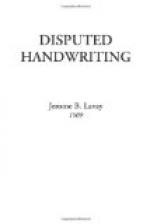While the qualification necessary for the permission of a witness to testify in court as an expert is largely discretionary with the judge, such discretion is usually exercised with so great liberality that it is not often that a witness offered as an expert is refused by the court on the ground of deficient qualification. It is usually held that any one possessed of anything more than ordinary opportunity for studying or observing handwriting may give expert testimony, which the jury may receive for what it is deemed to be worth. Bank officials and employees are declared by most courts to be competent witnesses. If on any previous occasion one has given testimony, that fact is usually accepted as a sufficient qualification, or if he has ever seen the person write whose writing is in question, he is deemed competent. With such limited qualification it is no matter of surprise that expert testimony is sometime made to appear at very great disadvantage. Incompetent and mercenary witnesses will seek employment, and since there are always two sides to a case, and on each side lawyers who spare no efforts for victory, there is a chance for every kind of witness, as there is for every kind of attorney.
Expert evidence is that given by one especially skilled in the subject to which it is applicable, concerning information beyond the range of ordinary observation and intelligence.
Opinion evidence is the conclusions of witnesses concerning certain propositions, drawn from ascertained or supposed facts, by those who have had better opportunities than the ordinary individual or witness to judge of the truth or falsity of such propositions, or who are familiar with the subject under inquiry, and give their conclusions from the facts within their own knowledge concerning certain questions involved.
Let us look at the question as it presents itself to the layman, to men of science and experience, to microscopists, to bank officials and others having much to do with writing. An expert in handwriting occupies a totally anomalous position when called before a court as a witness. Technically he is both a witness and an advocate, sharing the responsibilities of both but without the privileges of the latter. He has to instruct counsel and to prompt him during its course. But in cross examination he is more open to insult because the court does not see clearly how he arrives at his conclusions, and suspects whatever it does not understand. Nearly every person who has had to appear in court as an expert has been subjected to more or less humiliation by the judge.




